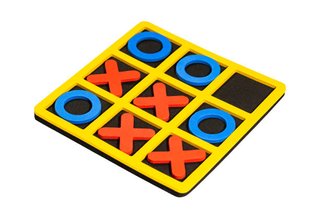The Psychology Behind Tic Tac Toe Moves
Tic Tac Toe may appear simple on the surface, but beneath each move lies a fascinating layer of human psychology. What drives someone to pick the center square over a corner? Why do players repeatedly fall for obvious traps? In this extended blog post, we'll explore the intricate web of behavioral science, emotional instincts, and subconscious biases that govern Tic Tac Toe decisions-and what this reveals about our minds.

1. The Center Obsession
The center square is not just mathematically powerful-it's psychologically comforting. Occupying the center feels like establishing dominance. It gives players the sense of control and symmetry, which the brain naturally craves. This preference stems from our instinct to position ourselves advantageously in both social and physical environments.
2. The Corner Trap
Experienced players often prioritize corners because they offer the potential to create forks-two winning paths. Yet beginners hesitate to use them effectively. This hesitancy is tied to risk aversion: corners feel "far" and risky, even though they're mathematically critical. Understanding this behavior helps explain common beginner mistakes.
3. Avoiding the Sides
Side cells are often neglected because they lack strategic power. Psychologically, humans prefer moves that feel significant. The sides are visually and functionally less rewarding, so players avoid them-despite their occasional utility in defense or forced draws. This reveals our tendency to over-prioritize visual symmetry and dramatic plays.
4. The Closure Principle
We're wired to complete patterns. Gestalt psychology shows how our brains seek closure and completion. In Tic Tac Toe, this manifests as the urge to finish a row-even when better options exist. This can lead to blunders, as players focus more on aesthetic completion than strategic defense.
"Our cognitive bias for closure can override logic, leading us to complete a line even when it's not the best move."
5. Defensive Thinking
Loss aversion is a well-documented psychological bias. Players often react defensively-blocking moves even when they have opportunities to win. This fear-based play is safe but not always smart. It mirrors decision-making in real life, where avoiding pain is more motivating than seeking pleasure.
6. Mirroring and Social Mimicry
Mirroring is a social behavior where people subconsciously mimic others. In Tic Tac Toe, this appears when players mimic their opponent's first move-responding to a corner with a corner, for example. It's not always rational, but it reflects the human desire for balance, fairness, and symmetry.

7. The Overthinking Trap
Sometimes the simplest games provoke the deepest overthinking. Players try to outsmart an opponent who's not planning anything complex, leading to suboptimal moves. This parallels analysis paralysis-a state where too many possibilities prevent action, a common human issue in both games and life.
8. Emotional Decision-Making
Frustration, anger, and overconfidence often seep into gameplay. Emotional interference leads to poor decisions-like trying to rush the game or ignoring defensive plays. Recognizing emotional states is key to mastering not only Tic Tac Toe but also decision-making under pressure.
9. The Need for Speed
Quick wins are tempting. Many players rush their moves, seeking fast gratification rather than long-term control. This mirrors human behavior in other areas-choosing instant rewards over delayed success. Tic Tac Toe teaches the value of patience and foresight.
Conclusion: What Tic Tac Toe Teaches Us About Ourselves
Tic Tac Toe is more than a childhood game-it's a psychological laboratory. The moves we make reflect how we think, react, and behave. Understanding the hidden motives behind each play can improve both your strategy and your self-awareness. And as simple as it seems, mastering Tic Tac Toe can sharpen your focus, planning, and emotional control-skills that are invaluable in daily life.
If you've ever dismissed Tic Tac Toe as "too easy," think again. There's a reason we still lose sometimes: not because we don't know the rules, but because we forget to manage the mind playing the game.
Back to Game